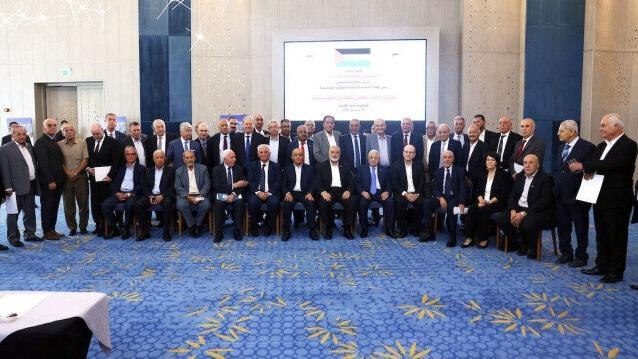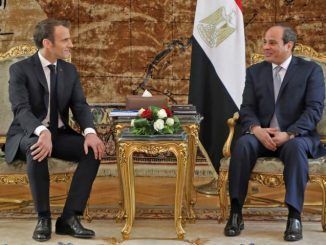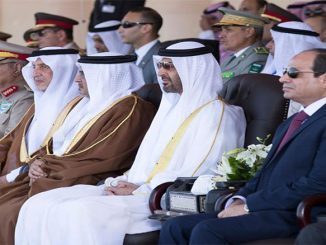
Palestinian factions met Sunday in Egypt to discuss reconciliation efforts as violence in the occupied West Bank surged between Israel and Palestinian militants.
The main groups, Hamas and Fatah, have been split since 2007 and repeated reconciliation attempts having failed, so expectations for the one-day meeting were low.
Participants at the closed-door meeting gave no indication of what was discussed. Palestinian President Mahmoud Abbas, who initiated the session in the Egyptian city of el-Alamein on the Mediterranean Sea, said at its conclusion only that the meeting was a “first and significant step” in efforts to end the long-running division.
Israel has been staging near-nightly raids in Palestinian areas of the territory, especially in areas where Abbas’ security forces have less of a foothold.
About the meeting
The rival Palestinian political leaders who met in Egypt have reportedly decided to form a committee on intra-Palestinian reconciliation.
President Mahmoud Abbas and Hamas leader Ismail Haniyeh met for rare face-to-face talks on Sunday in the coastal city of El Alamein along with representatives of most Palestinian political factions.
The latest attempt at reconciliation aims to bridge the gap between the parallel governments of Hamas in the blockaded Gaza Strip and of the Palestinian Authority – controlled by Abbas’s Fatah movement – which administers Palestinian-run areas of the occupied West Bank.
“I consider today’s meeting of the general secretaries of the Palestinian factions a first and important step in continuing our dialogue, which we hope will achieve the desired goals as soon as possible,” Abbas said in a statement after the meeting.
The 87-year-old president announced “the formation of a committee to continue the dialogue … end divisions and achieve Palestinian national unity”.
“We must return to a single state, a single system, a single law and a single legitimate army,” Abbas added.
Earlier on Sunday, Haniyeh called on Abbas to end “security collaboration” with Israel and “political arrests”, according to participants at the meeting.
The Hamas leader also said “a new, inclusive parliament must be formed on the basis of free democratic elections”.
Hamas won the Palestinians’ last legislative elections in 2006, but became the de facto ruler in the Gaza Strip a year later after wresting control from Fatah, which had attempted a pre-emptive coup to replace the Hamas-led government. Several weeks of violent fighting followed, resulting in Hamas ruling over the coastal enclave while Fatah – the dominant party in the Palestinian Authority – exercises limited self-rule in the occupied West Bank.
A later statement from Abbas said he “hopes for an upcoming meeting soon in Egypt to announce to our people the end” of the 17-year split “and the return to Palestinian national unity”.
Palestinian political scientist Moukhaimer Abu Saada told AFP news agency that the formation of the committee was no cause for celebration.
“The best way to kill something is to form a committee for it,” he said, speaking from Gaza.
He said he doubted the move would produce any progress towards “ending the division or setting a date for Palestinian elections”.
On Sunday, Haniyeh called for “the restructuring of the Palestine Liberation Organization”, the umbrella institution promoting Palestinian statehood. The PLO includes most Palestinian political factions, but not Hamas or Islamic Jihad.
The PLO is “the sole legitimate representative of the Palestinian people”, Abbas said.
“It is not permissible for any Palestinian to have reservations about this organisation and its national and political programme,” Abbas said. “Rather, it is necessary to unanimously protect it, because it is considered one of the most important gains of our people.”
He also called for “peaceful popular resistance”, while Haniyeh touted “comprehensive resistance”.
The last time the two leaders officially met was last July in Algiers, after a five-year gap.
Abbas and Haniyeh were joined by the heads of other factions, except for the Palestinian Islamic Jihad (PIJ) and two other groups.
The PIJ had made the release of prisoners held by PA security forces a condition for sending representatives to El Alamein.
Khaled al-Batsh, a PIJ leader, said the group had “hoped for a response from Mahmoud Abbas to grievances and calls for the release” of its members detained in the occupied West Bank.
“We have been surprised by an unprecedented security incursion against resistance fighters,” he said.
Sunday’s meeting came amid a resurgence of violence in the Israeli-Palestinian conflict, particularly in the West Bank, which Israel has occupied since the 1967 Middle East war.
More than 200 Palestinians have been killed by Israeli forces this year alone.
Officials have warned that 2023 is on track to be the deadliest year for Palestinians in the West Bank since the United Nations began keeping track of fatalities in 2005.



